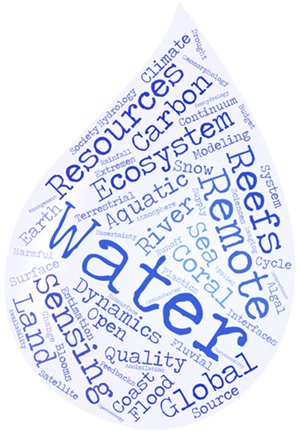Water & Ecosystems

To better understand the Earth's land and coastal waters and their ability to sustain life
Our group investigates water and ecosystems on the land and at the land-sea interface, and the interaction of freshwater with other processes of the Earth System. We combine remote sensing from spaceborne (satellites and International Space Station instruments) and airborne (aircrafts, drones) platforms with in situ observations and computer models to advance scientific understanding and to evaluate societal implications. We specialize in a broad range of topics, including the terrestrial water cycle, inland and aquatic ecosystems, water-ecosystem interactions, and land-sea interactions. Our activities include the observation and modeling of snow, rivers, lakes, reservoirs, permafrost, groundwater, evapotranspiration, soil moisture, carbon-water-energy interactions, and their responses to an evolving climate. We also study the interactions between water and humans—both the impact of humans on the water cycle, and the implications of changes in the water cycle for society—including water resource management, water quality, floods and droughts.
Similarly to other groups in JPL’s Earth Science Section, the Water and Ecosystems Group is involved at all stages of the mission life cycle for Earth orbiting satellites. Our activities can be broadly summarized into four categories:
- Scientific Discovery. We combine spaceborne, airborne, and in situ observations with scientific theory to shed new light on Earth’s geophysical and biogeochemical processes.
- Applications. We link advances in understanding of the water cycle to practical Earth science applications to support sustainable water and natural resources management and maximize societal benefit.
- Mission Support. We closely collaborate with the teams managing and operating existing and upcoming NASA missions (also known as “flight projects”).
- Mission Formulation. We plan for the future of Earth spaceborne observations by evaluating scientific challenges in light of available technology to help motivate new missions.
Inclusion of all ideas, employees, and communities is a key value at JPL. We promote an inclusive environment by actively supporting and embracing diversity in its broadest representation.
If you are interested in collaborating or learning more about the Water and Ecosystems Group and our activities at JPL, please reach out to us.
Science Questions
Our group uses data from NASA’s remote sensing assets, along with computer models and in situ observations to explore water, ecosystems, and their interactions within the Earth System, answering four fundamental questions:
- How are the stores and fluxes of water changing across the Earth in time and in space, and what are the mechanisms for these changes?
- How do changes in the supply, use, and quality of water affect the terrestrial biosphere, and ultimately society?
- How do terrestrial and marine processes affect ecosystem productivity in inland waters and the coastal ocean?
- How do water-ecosystem feedbacks regulate the carbon, water and energy cycles in the Earth System?
Water and Ecosystems: Current Missions and Projects
- SMAP - Soil Moisture Active Passive, http://smap.jpl.nasa.gov/
- GRACE-FO - Gravity Recovery and Climate Experiment Follow On, https://gracefo.jpl.nasa.gov/
- ECOSTRESS - ECOsystem Spaceborne Thermal Radiometer Experiment on Space Station, https://ecostress.jpl.nasa.gov/
- SWOT - Surface Water and Ocean Topography, https://swot.jpl.nasa.gov/
- NISAR - NASA-ISRO SAR Mission, https://nisar.jpl.nasa.gov/
- CYGNSS - Cyclone Global Navigation Satellite System https://www.nasa.gov/cygnss/
- S-MODE - Sub-mesoscale Ocean Dynamics Experiment, https://espo.nasa.gov/s-mode/content/S-MODE
- SBG - Surface Biology and Geology, https://sbg.jpl.nasa.gov/
- MC - Mass Change, https://science.nasa.gov/earth-science/decadal-mc
- SDC - Surface Deformation and Change, https://science.nasa.gov/earth-science/decadal-sdc
- SMASH - Small Altimetry Satellites for Hydrology
- Clima - Climate Modeling Alliance, https://clima.caltech.edu/
- CMS Flux - Carbon Monitoring System Flux, https://cmsflux.jpl.nasa.gov/
- RAPID - Routing Application for Parallel computatIon of Discharge, http://rapid-hub.org/